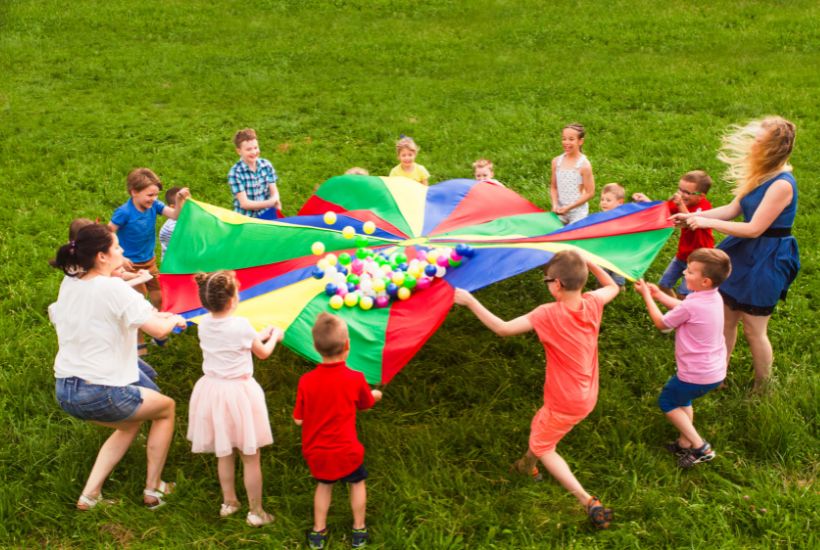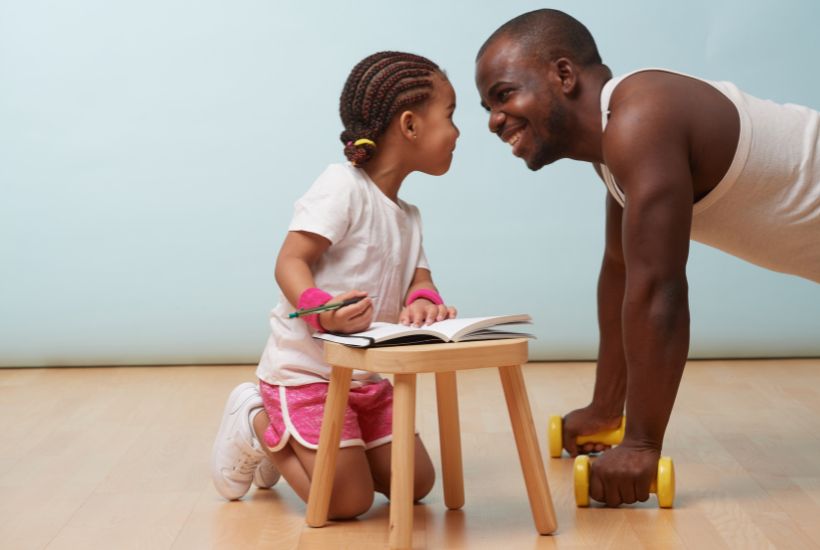8 Ways to Raise a Social Child
A child with good social skills has more confidence to interact with people. I get calls all the time from parents who are struggling with helping their children become social.
Their kids are sensitive and shy; they don’t feel comfortable speaking up or joining in with other kids. The parents are at a loss for what to do. They’ve tried everything they can, but nothing has worked so far.
If you’re struggling with helping your child become more social, here are 8 ways to help improve your child’s social skills:

1# Have open conversations with engaging questions
When you’re talking with your child, make sure to ask open-ended questions. These questions can’t be answered with a simple yes or no.
They require your child to think and answer in complete sentences. Here are some examples of open-ended questions:
- What mistakes did you make today, and how did you learn from them?
- Who made you laugh today?
- Tell me about your favorite part of the day.
Asking these questions will help you get to know your child better and encourage them to open up more. It’s a great way to start building a foundation for strong communication.
2# Give them the attention when they talk to you
You must give your child your undivided attention when they’re talking to you.
This means removing distractions, such as your phone or the TV. Instead, make eye contact and really listen to what they’re saying.
Let them know that you value their thoughts and opinions. This will make them feel more comfortable talking to you and encourage them to open up more.
If you struggle to give your child your undivided attention, try setting aside a specific time to talk with them each day.
This can be first thing in the morning at breakfast or before bedtime. Tell them that they have your full attention during this time and that you’re open to talking about anything they want.
Giving your child your undivided attention will show them that you value their thoughts and opinions.
This will make them feel more comfortable talking to you and encourage them to open up more.
3# Model Social behavior
One of the best ways to encourage your child to be social is to model social behavior yourself.
When you’re out in public, take the opportunity to talk with other adults. Smile and make eye contact. Strike up conversations with people you know and people you don’t know.
Your child will learn from your example and will start to mimic your behavior. Show them that being social is a positive experience and something to be enjoyed.
It’s also important to model appropriate social behavior at home.
If you have friends or family over, take the time to talk with them. Let your child see that you’re comfortable talking with other people. This will help them feel more comfortable doing the same.
4# Role play social situations
One of the best ways to help your child become more social is to role-play different social situations.
This will allow them to practice what they say and do in different situations. It will also help them feel more comfortable and confident when they’re around other people.
Some social situations you can role-play include:
- Meeting someone new
- Asking a friend to play
- Starting a conversation
- Answering questions in class
- Ordering food at a restaurant
You can also role-play different scenarios that might be difficult for your child.
For example, if they’re shy around other kids, you can role-play what they would say and do if they wanted to ask a child to play.
If they’re having trouble making friends, you can role-play different ways to start a conversation.
Role-playing social situations will help your child feel more comfortable and confident around other people. It’s also a great way to teach them how to handle different situations.

5# Teach them about feelings and emotions
You must teach your child about different feelings and emotions. This will help them to understand their own emotions and the emotions of others.
Some things you can do to teach your child about emotions include:
- Reading books about feelings and emotions
- Talking about how you’re feeling and why
- Labeling different emotions in pictures
- Acting out different emotions
- Asking your child how they’re feeling and why
- Encouraging them to express their feelings

Teaching your child about different emotions will help them understand their own feelings and the emotions of others. This is an important skill for social interactions.
It will also help them be more empathetic and understand the feelings of others.
Encouraging your child to express their emotions is also important. This will help them feel more comfortable talking about their feelings. It will also help prevent bottled-up emotions, which can lead to later problems.
Allowing your child to express their emotions will also help you understand how they’re feeling and what they’re going through. This can be a great way to bond with your child and build a strong relationship.
Encouraging your child to express their emotions is important in helping them develop social skills.
6# Point out times when they’ve been successful in social situations
One of the best ways to encourage your child to be social is to praise their efforts when they’re successful in social situations.
This will show them that you’re noticing their progress and that you’re proud of them. It will also motivate them to keep trying new things and expanding their social skills.
Some things you can praise your child for include:
- Starting a conversation with someone new
- Asking a question in class
- Answering a question from a friend
- Joining in on a game or activity
- Sharing something with a friend
Praising your child’s efforts will show them that you’re noticing their progress and that you’re proud of them. In addition, it motivates them to keep trying new things and expanding their social skills.
Praising your child’s efforts is an important part of helping them to develop social skills.
7# Know your child’s capabilities
As a parent, it is also important to know your child’s capabilities. Each child is different and will develop social skills at their own pace.
Some children are naturally outgoing and social, while others are more introverted and take longer to warm up to new people and situations.
It’s important to remember that there is nothing wrong with being introverted. Some of the most successful people in the world are introverts.
All children want to succeed and putting your child in a situation, you know they cant handle will only lead to frustration and disappointment.
8# Set realistic Expectations
It’s important to set realistic expectations for your child. If you expect them to be the life of the party, you will be disappointed. And if they think they have to be perfect, they will be anxious and stressed.
Remember that social skills take time to develop. So it’s important to encourage your child and praise their efforts, even small ones.
All children want to succeed, and putting your child in a situation you know they can handle will help them build confidence and feel good about themselves.
Setting realistic expectations for your child is an important part of helping them to develop social skills.

Activities that can help with a child’s social skills
Several activities can help with a child’s social skills. Here are a few ideas:
Join a sports team or club
This is an excellent way for children to meet new people and learn to work as part of a team. It will also teach them about cooperation and competition.
Acting classes
Acting classes are a great way for children to express themselves. They will also learn about body language and how to interpret the emotions of others.
Improvisation games
Improvisation games are great for helping children think on their feet and come up with creative solutions. They’re also a lot of fun!
Get a pet
Pets are a great way to teach responsibility and empathy. They can also help children feel less alone and more connected to their world.
Get a Job
A part-time job is a great way for children to learn about work. They will also learn to interact with people of all ages and from all walks of life.
Volunteer
Volunteering is an excellent way for children to help others and feel good about themselves. It’s also a great way to meet new people and learn new skills.
These are just a few ideas. Many other activities can help with a child’s social skills. It is important to find something your child enjoys that will help them grow and learn.

What NOT to do if you want to raise a social child
In addition to knowing what TO DO, it’s important to know what NOT to DO if you want to raise a social child.
Here are a few things to avoid:
Don’t force them to be social.
Forcing your child to be social is not going to help. It will only make them anxious and stressed. If you want your child to be social, you must let them take things at their own pace.
Don’t compare them to other children.
Each child is different and will develop social skills at their own pace. Comparing your child to other children will make them feel bad about themselves.
Don’t punish them for being introverted.
Some children are naturally introverted, and that’s okay. However, punishing them for being introverted is not going to help. It will only make them feel bad about themselves.
These are just a few things to avoid. If you want to raise a social child, it’s important to be patient and understanding. Social skills take time to develop.

Conclusion
If you want to help your child develop social skills, you can do a few things. For example, join a sports team or club, take acting classes, or play improvisation games.
Setting realistic expectations for your child and avoiding forcing them to be social is also important. Social skills take time to develop.
With patience and understanding, you can help your child become more social.






